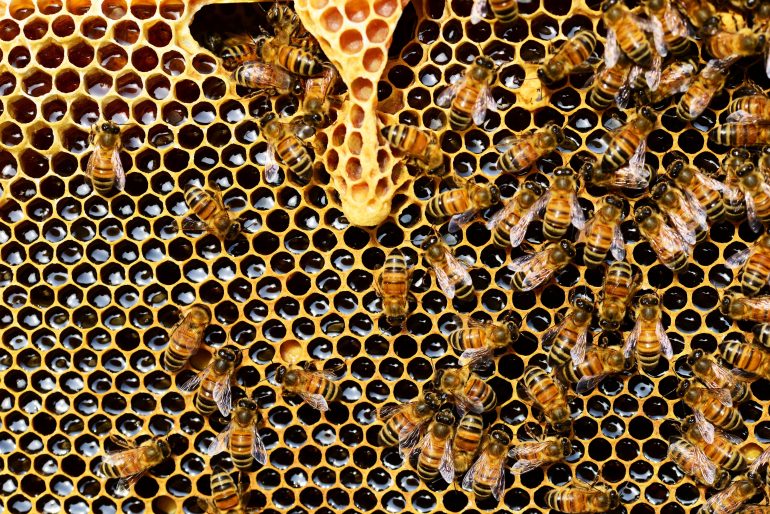Heat and drought are taking a severe toll on Iraqi bees and honey production in the central province of Babylon.
Beekeeper Mohamed Aliawi is witnessing this firsthand as he inspects numerous hive boxes nestled at the base of towering palm trees in the Al-Reghila village fields. “There is no water and therefore no (flowering) plants to keep the bees satisfied,” said Aliawi, the deputy director of a local apiarist association, in a conversation with AFP.
The parched earth makes cultivating melons and watermelons challenging, especially amidst lingering drought and intense July temperatures — often reaching around 50 degrees Celsius (122 degrees Fahrenheit) — that also adversely affect bees.
A bee’s survival hinges on its continuous foraging for pollen and nectar, the key ingredients for honey production. Aliawi explained that bees, under normal circumstances, travel hundreds of yards to gather these resources. However, the drought is pushing bees to extend their journey up to three miles (five kilometers) for pollination.
“This impacts the lifespan of the worker bee,” the female bee that collects pollen and nectar, explained Aliawi. “Under optimal circumstances, the worker bee can live up to 60 days, but in this current situation it only lives 20 days.”
Furthermore, bees typically flourish at temperatures of around 30-35 degrees Celsius (86-95 degrees Fahrenheit), not in the scorching heat of 50 degrees Celsius (122 degrees Fahrenheit), added Aliawi, who also heads a private honey production company.
In response to these conditions, Aliawi has relocated numerous bee hives from central Iraq to seven cooler, greener locations scattered across the northern Iraq’s Kurdistan Region mountains. “If we don’t move the bees, they suffer,” he said.
Relocating hives
During an inspection on a sweltering July day, Aliawi and his team donned protective headgear to examine the bee hive boxes and their inner honeycombs. They used a bee smoker to waft smoke over the hives, a known method to pacify the insects.
Aliawi noted that in the early 2000s, each bee hive produced approximately 20 to 25 kilograms (44 to 55 pounds) of honey annually. Now, that output has dropped to just around five kilograms (11 pounds).
The United Nations lists Iraq as one of the five countries globally most impacted by certain effects of climate change. Officials report that the country is experiencing its fourth consecutive year of drought.
Plagued by blistering summers, diminishing rainfall, frequent sandstorms, and decreased flow of the Tigris and Euphrates rivers due to upstream dams, Iraq faces significant environmental challenges.
Nonetheless, Hashem Al-Zeheiri, head of the apiarist department at the Agriculture Ministry, maintains an optimistic outlook, asserting that honey production is “increasing year on year.”
In 2022, the areas of Iraq under the control of the Baghdad federal authorities produced 870 metric tons of honey, while Kurdistan produced 850 metric tons, marking an increase from approximately 700 metric tons in each territory the prior year.
The plight of honey farmers extends to the Kurdistan Region as well. Unpredictable weather patterns led local farmers to report a 50% decrease in production in Kurdistan’s Balakayati region just last year.
Honey farming is a traditional occupation for those residing in the more temperate, mountainous regions of Kurdistan. Unforeseen weather disruptions pose serious threats to what might be their only source of income.
Zeheiri has prepared a study on the advantages of relocating bee hives between southern and central Iraq and Kurdistan based on respective needs, aiming to boost yields.
Sand storms
In the face of sandstorms, the United Nations Development Programme highlighted in a 2020 report that beekeeping has an estimated history of 8,000 years in Iraq, with ancient Sumerian tablets inscribing “recipes that use honey for medicinal purposes.”
In contemporary Iraq, beekeeping is largely male-dominated, but that hasn’t deterred Zeinab Al-Maamuri. Her passion developed after her late husband introduced her to the hobby. Now in her early 50s and three decades later, Maamuri manages 250 bee hives in Babylon province, with dozens housed in her family’s courtyard.
She mourns the effects of global warming on her bees, noting, “The rise in temperatures affects bees… the queen stops laying eggs” when the heat becomes too intense. Further, she remarked that during the frequent sandstorms that assail the country, “if the bees are out, half will not return.”
AFP/NRT English


